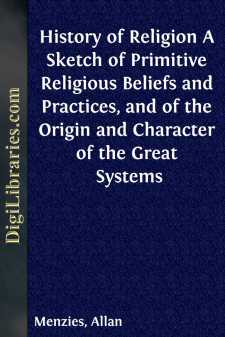Religion
- Agnosticism 2
- Antiquities & Archaeology 21
- Atheism 12
- Biblical Criticism & Interpretation 15
- Biblical Meditations 3
- Biblical Reference 1
- Biblical Studies 11
- Buddhism 8
- Christian Church 52
- Christian Education 5
- Christian Life 26
- Christianity 60
- Cults 2
- Devotional 6
- Eastern 2
- Education 4
- Eschatology 1
- Ethics 3
- General
- Gnosticism 1
- Hinduism 15
- History 28
- Holidays 10
- Inspirational 1
- Islam 8
- Judaism 3
- Leadership 1
- Meditations 3
- Monasticism 1
- Mysticism 11
- Philosophy 4
- Prayer 26
- Prayerbooks 5
- Religion & Science 12
- Sermons 54
- Spirituality 53
- Theism 2
- Theology 17
- Theosophy 15
General Books
Sort by:
CHAPTER I THE NATURE OF GODS Before dealing with the special varieties of the Egyptians' belief in gods, it is best to try to avoid a misunderstanding of their whole conception of the supernatural. The term god has come to tacitly imply to our minds such a highly specialised group of attributes, that we can hardly throw our ideas back into the more remote conceptions to which we also attach the...
more...
INTRODUCTION. THE SIGNIFICANCE OF FRANZ CUMONT'S WORK. Franz Cumont, born January 3, 1868, and educated at Ghent, Bonn, Berlin, and Paris, resides in Brussels, and has been Professor in the University of Ghent since 1892. His monumental work, Textes et monuments figurés relatifs aux mystères de Mithra, published in 1896 and 1899 in two volumes, was followed in 1902 by the separate publication,...
more...
INTRODUCTION. It has been my endeavour in the ensuing narratives to bring together such of the more distinguished Missionaries of the English and American nations as might best illustrate the character and growth of Mission work in the last two centuries. It is impossible to make it a real history of the Missions of modern times. If I could, I would have followed in the track of Mr. Maclear’s...
more...
ZUÑI PHILOSOPHY. The Á-shi-wi, or Zuñis, suppose the sun, moon, and stars, the sky, earth, and sea, in all their phenomena and elements; and all inanimate objects, as well as plants, animals, and men, to belong to one great system of all-conscious and interrelated life, in which the degrees of relationship seem to be determined largely, if not wholly, by the degrees of resemblance. In this system of...
more...
by:
Gilbert Murray
SATURNIA REGNA Many persons who are quite prepared to admit the importance to the world of Greek poetry, Greek art, and Greek philosophy, may still feel it rather a paradox to be told that Greek religion specially repays our study at the present day. Greek religion, associated with a romantic, trivial, and not very edifying mythology, has generally seemed one of the weakest spots in the armour of those...
more...
I THE HOLY SYNOD AND TOLSTOI. When Count Tolstoi was excommunicated by the Holy Synod of Russia because "he preached the teachings which are contrary to the Christian faith," the world was divided in opinion and sympathy into two parts. The partisans of Tolstoi were in the majority in the Western world; those of the Holy Synod in Russia and the Orthodox East. Yet Holy Russia rejected Tolstoi...
more...
by:
John Brownlie
INTRODUCTION This fourth series of Hymns from the Office Books of The Holy Eastern Church, differs from the preceding three in this, that the hymns are less translations or renderings, and more centos and suggestions. One cannot continue long to interest himself in any work, and receive from time to time the observations and criticisms of his fellows, without, if he have his eyes and mind open to...
more...
by:
Martin Luther
INTRODUCTION 1. The Occasion of the Work.—Luther did not impose himself as reformer upon the Church. In the course of a conscientious performance of the duties of his office, to which he had been regularly and divinely called, and without any urging on his part, he attained to this position by inward necessity. In 1515 he received his appointment as the standing substitute for the sickly city pastor,...
more...
by:
Allan Menzies
INTRODUCTION The science to which this little volume is devoted is a comparatively new one. It is scarcely half a century since the attention of Western Europe began to fix itself seriously on the great religions of the East, and the study of these ancient systems aroused reflection on the great facts that the world possesses not one religion only, but several, nay, many religions, and that these...
more...
CHAPTER THE FIRST THE COSMOGONY OF MODERN RELIGION1. MODERN RELIGION HAS NO FOUNDERPerhaps all religions, unless the flaming onset of Mohammedanism be an exception, have dawned imperceptibly upon the world. A little while ago and the thing was not; and then suddenly it has been found in existence, and already in a state of diffusion. People have begun to hear of the new belief first here and then...
more...











